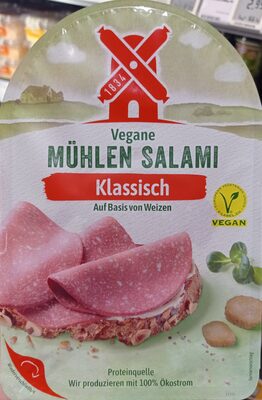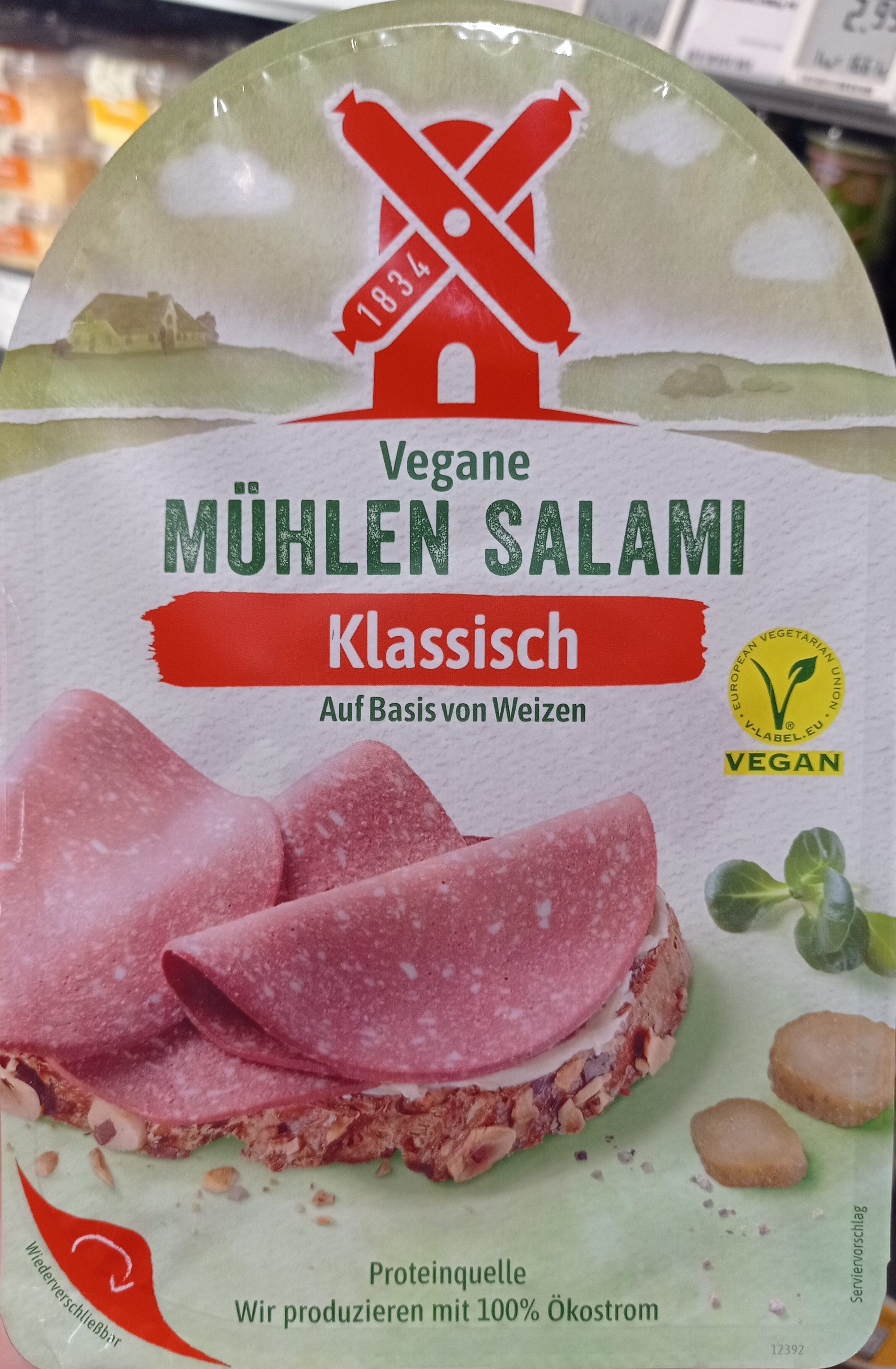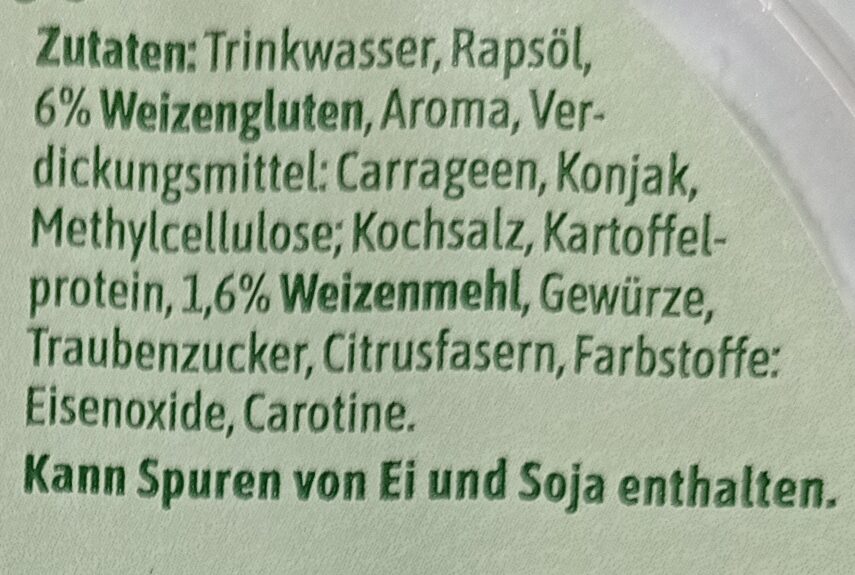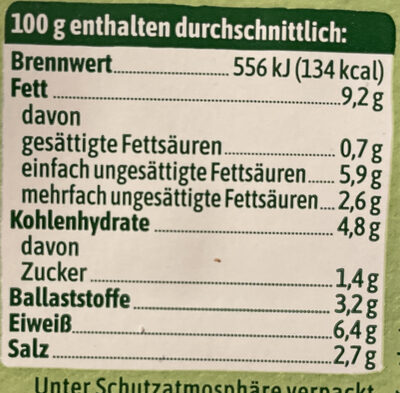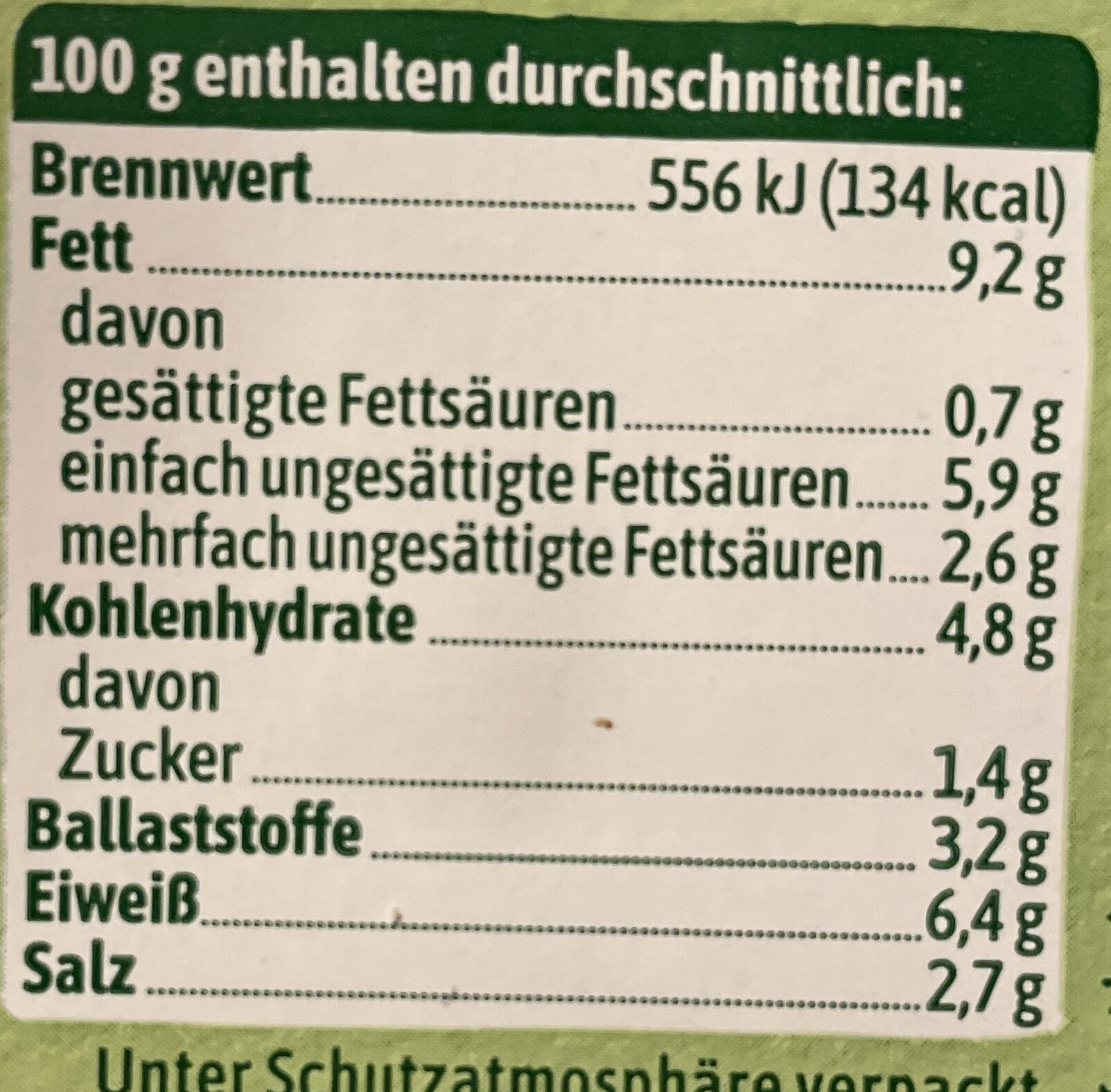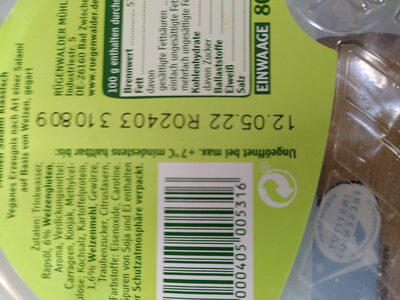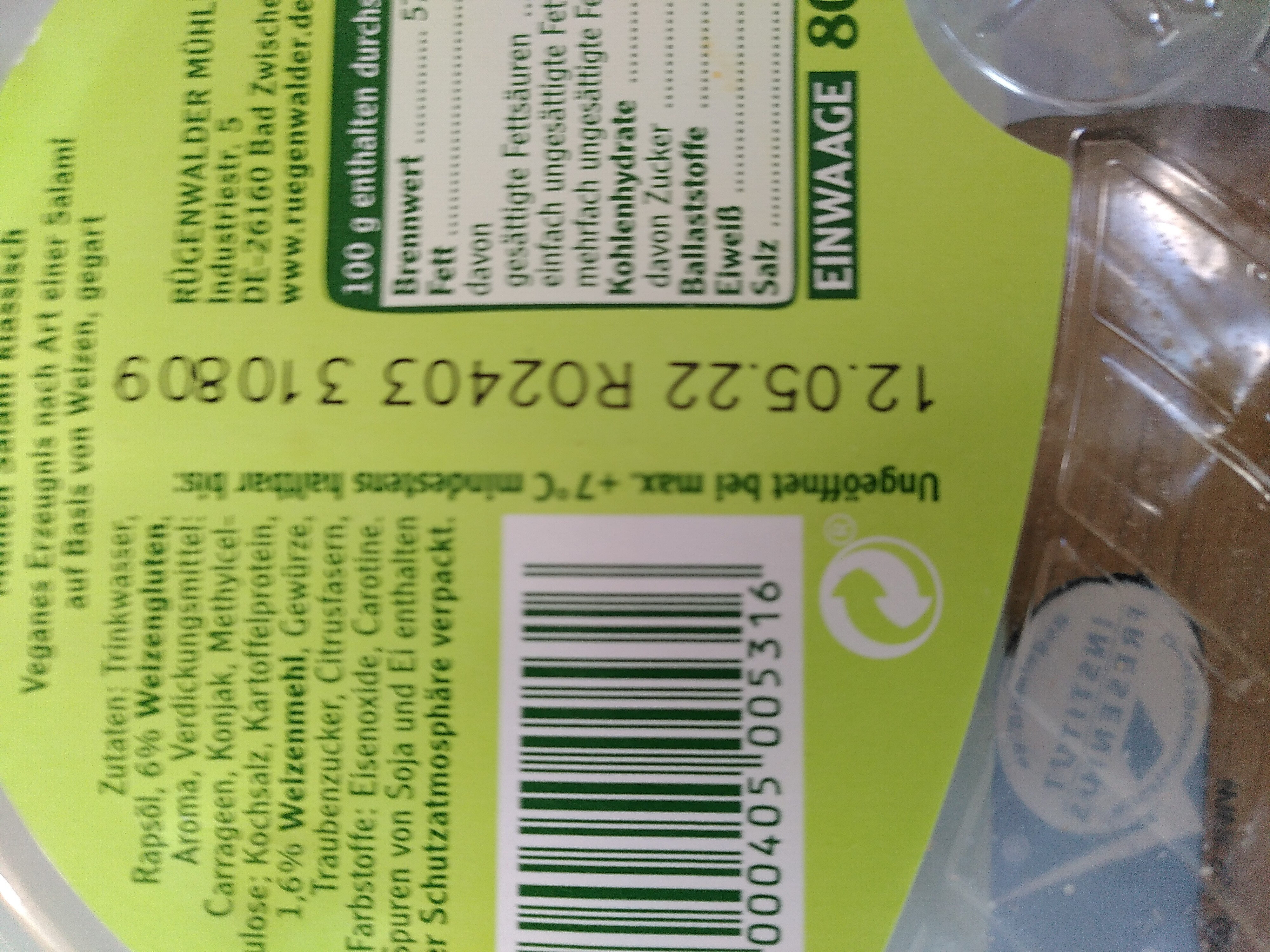Help us make food transparency the norm!
As a non-profit organization, we depend on your donations to continue informing consumers around the world about what they eat.
The food revolution starts with you!
Vegane Mühlen Salami Klassisch - Rügenwalder Mühle - 80 g
Vegane Mühlen Salami Klassisch - Rügenwalder Mühle - 80 g
This product page is not complete. You can help to complete it by editing it and adding more data from the photos we have, or by taking more photos using the app for Android or iPhone/iPad. Thank you!
×
Barcode: 4000405005316 (EAN / EAN-13)
Quantity: 80 g
Packaging: Plastic
Brands: Rügenwalder Mühle
Categories: Meat alternatives, Meat analogues, Vegetarian sausages, de:Vegane Wurst
Labels, certifications, awards:
Vegetarian, Vegan, European Vegetarian Union, European Vegetarian Union Vegan, European Vegetarian Union Vegetarian, Green Dot, Institut Fresenius



Link to the product page on the official site of the producer: https://www.ruegenwalder.de/produkte/veg...
Stores: EDEKA, PENNY, REWE, Netto Marken-Discount, Kaufland, Tegut
Countries where sold: Germany
Matching with your preferences
Health
Ingredients
-
17 ingredients
drinking water, rapeseed oil, wheat gluten (9%), dried egg white, thickener: carrageenan, xanthan gum, locust bean gum: flavouring, table salt, wheat flour (2%), glucose, modified starch, spices, colourings: iron oxide, caroteneAllergens: GlutenTraces: Eggs, Soybeans
Food processing
-
Ultra processed foods
Elements that indicate the product is in the 4 - Ultra processed food and drink products group:
- Additive: E160a - Carotene
- Additive: E172 - Iron oxides and iron hydroxides
- Additive: E407 - Carrageenan
- Additive: E461 - Methyl cellulose
- Ingredient: Colour
- Ingredient: Flavouring
- Ingredient: Gluten
- Ingredient: Thickener
Food products are classified into 4 groups according to their degree of processing:
- Unprocessed or minimally processed foods
- Processed culinary ingredients
- Processed foods
- Ultra processed foods
The determination of the group is based on the category of the product and on the ingredients it contains.
Additives
-
E160a - Carotene
Carotene: The term carotene -also carotin, from the Latin carota, "carrot"- is used for many related unsaturated hydrocarbon substances having the formula C40Hx, which are synthesized by plants but in general cannot be made by animals -with the exception of some aphids and spider mites which acquired the synthesizing genes from fungi-. Carotenes are photosynthetic pigments important for photosynthesis. Carotenes contain no oxygen atoms. They absorb ultraviolet, violet, and blue light and scatter orange or red light, and -in low concentrations- yellow light. Carotenes are responsible for the orange colour of the carrot, for which this class of chemicals is named, and for the colours of many other fruits, vegetables and fungi -for example, sweet potatoes, chanterelle and orange cantaloupe melon-. Carotenes are also responsible for the orange -but not all of the yellow- colours in dry foliage. They also -in lower concentrations- impart the yellow coloration to milk-fat and butter. Omnivorous animal species which are relatively poor converters of coloured dietary carotenoids to colourless retinoids have yellowed-coloured body fat, as a result of the carotenoid retention from the vegetable portion of their diet. The typical yellow-coloured fat of humans and chickens is a result of fat storage of carotenes from their diets. Carotenes contribute to photosynthesis by transmitting the light energy they absorb to chlorophyll. They also protect plant tissues by helping to absorb the energy from singlet oxygen, an excited form of the oxygen molecule O2 which is formed during photosynthesis. β-Carotene is composed of two retinyl groups, and is broken down in the mucosa of the human small intestine by β-carotene 15‚15'-monooxygenase to retinal, a form of vitamin A. β-Carotene can be stored in the liver and body fat and converted to retinal as needed, thus making it a form of vitamin A for humans and some other mammals. The carotenes α-carotene and γ-carotene, due to their single retinyl group -β-ionone ring-, also have some vitamin A activity -though less than β-carotene-, as does the xanthophyll carotenoid β-cryptoxanthin. All other carotenoids, including lycopene, have no beta-ring and thus no vitamin A activity -although they may have antioxidant activity and thus biological activity in other ways-. Animal species differ greatly in their ability to convert retinyl -beta-ionone- containing carotenoids to retinals. Carnivores in general are poor converters of dietary ionone-containing carotenoids. Pure carnivores such as ferrets lack β-carotene 15‚15'-monooxygenase and cannot convert any carotenoids to retinals at all -resulting in carotenes not being a form of vitamin A for this species-; while cats can convert a trace of β-carotene to retinol, although the amount is totally insufficient for meeting their daily retinol needs.Source: Wikipedia
-
E407 - Carrageenan
Carrageenan (E407), derived from red seaweed, is widely employed in the food industry as a gelling, thickening, and stabilizing agent, notably in dairy and meat products.
It can exist in various forms, each imparting distinct textural properties to food.
However, its degraded form, often referred to as poligeenan, has raised health concerns due to its potential inflammatory effects and its classification as a possible human carcinogen (Group 2B) by the International Agency for Research on Cancer (IARC).
Nevertheless, food-grade carrageenan has been deemed safe by various regulatory bodies when consumed in amounts typically found in food.
-
E461 - Methyl cellulose
Methyl cellulose: Methyl cellulose -or methylcellulose- is a chemical compound derived from cellulose. It is a hydrophilic white powder in pure form and dissolves in cold -but not in hot- water, forming a clear viscous solution or gel. It is sold under a variety of trade names and is used as a thickener and emulsifier in various food and cosmetic products, and also as a treatment of constipation. Like cellulose, it is not digestible, not toxic, and not an allergen.Source: Wikipedia
Ingredients analysis
-
May contain palm oil
Ingredients that may contain palm oil: E160a
-
Vegan
No non-vegan ingredients
Unrecognized ingredients: Grape sugar
-
Vegetarian
No non-vegetarian ingredients detected
Unrecognized ingredients: Grape sugar
-
Details of the analysis of the ingredients
de: Trinkwasser, Rapsöl, Weizengluten 6%, Aroma, Verdickungsmittel (Carrageen), Konjak, Methylcellulose, Kochsalz, Kartoffelprotein, Weizenmehl 1.6%, Gewürze, Traubenzucker, Citrusfaser, Farbstoffe (Eisenoxide), Carotine- Trinkwasser -> en:water - vegan: yes - vegetarian: yes - ciqual_food_code: 18066 - percent_min: 17.6 - percent_max: 76.8
- Rapsöl -> en:rapeseed-oil - vegan: yes - vegetarian: yes - from_palm_oil: no - percent_min: 6 - percent_max: 41.4
- Weizengluten -> en:wheat-gluten - vegan: yes - vegetarian: yes - percent_min: 6 - percent: 6 - percent_max: 6
- Aroma -> en:flavouring - vegan: maybe - vegetarian: maybe - percent_min: 1.6 - percent_max: 5
- Verdickungsmittel -> en:thickener - percent_min: 1.6 - percent_max: 5
- Carrageen -> en:e407 - vegan: yes - vegetarian: yes - percent_min: 1.6 - percent_max: 5
- Konjak -> en:e425 - vegan: yes - vegetarian: yes - percent_min: 1.6 - percent_max: 5
- Methylcellulose -> en:e461 - vegan: yes - vegetarian: yes - percent_min: 1.6 - percent_max: 5
- Kochsalz -> en:salt - vegan: yes - vegetarian: yes - ciqual_food_code: 11058 - percent_min: 1.6 - percent_max: 2.7
- Kartoffelprotein -> en:potato-protein - vegan: yes - vegetarian: yes - percent_min: 1.6 - percent_max: 2.7
- Weizenmehl -> en:wheat-flour - vegan: yes - vegetarian: yes - ciqual_proxy_food_code: 9410 - percent_min: 1.6 - percent: 1.6 - percent_max: 1.6
- Gewürze -> en:spice - vegan: yes - vegetarian: yes - percent_min: 0 - percent_max: 1.6
- Traubenzucker -> en:grape-sugar - percent_min: 0 - percent_max: 1.6
- Citrusfaser -> en:citrus-fibre - vegan: yes - vegetarian: yes - percent_min: 0 - percent_max: 1.6
- Farbstoffe -> en:colour - percent_min: 0 - percent_max: 1.6
- Eisenoxide -> en:e172 - vegan: yes - vegetarian: yes - percent_min: 0 - percent_max: 1.6
- Carotine -> en:e160a - vegan: maybe - vegetarian: maybe - from_palm_oil: maybe - percent_min: 0 - percent_max: 1.6
Nutrition
-
Average nutritional quality
⚠ ️Warning: the amount of fruits, vegetables and nuts is not specified on the label, it was estimated from the list of ingredients: 23This product is not considered a beverage for the calculation of the Nutri-Score.
Positive points: 3
- Proteins: 3 / 5 (value: 6.4, rounded value: 6.4)
- Fiber: 3 / 5 (value: 3.2, rounded value: 3.2)
- Fruits, vegetables, nuts, and colza/walnut/olive oils: 0 / 5 (value: 23.7, rounded value: 23.7)
Negative points: 11
- Energy: 1 / 10 (value: 556, rounded value: 556)
- Sugars: 0 / 10 (value: 1.4, rounded value: 1.4)
- Saturated fat: 0 / 10 (value: 0.7, rounded value: 0.7)
- Sodium: 10 / 10 (value: 1080, rounded value: 1080)
The points for proteins are not counted because the negative points are greater or equal to 11.
Nutritional score: (11 - 3)
Nutri-Score:
-
Nutrient levels
-
Fat in moderate quantity (9.2%)
What you need to know- A high consumption of fat, especially saturated fats, can raise cholesterol, which increases the risk of heart diseases.
Recommendation: Limit the consumption of fat and saturated fat- Choose products with lower fat and saturated fat content.
-
Saturated fat in low quantity (0.7%)
What you need to know- A high consumption of fat, especially saturated fats, can raise cholesterol, which increases the risk of heart diseases.
Recommendation: Limit the consumption of fat and saturated fat- Choose products with lower fat and saturated fat content.
-
Sugars in low quantity (1.4%)
What you need to know- A high consumption of sugar can cause weight gain and tooth decay. It also augments the risk of type 2 diabetes and cardio-vascular diseases.
Recommendation: Limit the consumption of sugar and sugary drinks- Sugary drinks (such as sodas, fruit beverages, and fruit juices and nectars) should be limited as much as possible (no more than 1 glass a day).
- Choose products with lower sugar content and reduce the consumption of products with added sugars.
-
Salt in high quantity (2.7%)
What you need to know- A high consumption of salt (or sodium) can cause raised blood pressure, which can increase the risk of heart disease and stroke.
- Many people who have high blood pressure do not know it, as there are often no symptoms.
- Most people consume too much salt (on average 9 to 12 grams per day), around twice the recommended maximum level of intake.
Recommendation: Limit the consumption of salt and salted food- Reduce the quantity of salt used when cooking, and don't salt again at the table.
- Limit the consumption of salty snacks and choose products with lower salt content.
-
-
Nutrition facts
Nutrition facts As sold
for 100 g / 100 mlAs sold
per serving (11.42g)Compared to: Vegetarian sausages Energy 556 kj
(134 kcal)63.5 kj
(15 kcal)-38% Fat 9.2 g 1.05 g -31% Saturated fat 0.7 g 0.08 g -71% Monounsaturated fat 5.9 g 0.674 g -32% Polyunsaturated fat 2.6 g 0.297 g -47% Carbohydrates 4.8 g 0.548 g -31% Sugars 1.4 g 0.16 g -9% Fiber 3.2 g 0.365 g -20% Proteins 6.4 g 0.731 g -56% Salt 2.7 g 0.308 g +62% Fruits‚ vegetables‚ nuts and rapeseed‚ walnut and olive oils (estimate from ingredients list analysis) 23.7 % 23.7 %
Environment
-
Eco-Score B - Low environmental impact
⚠ ️Select a country in order to include the full impact of transportation.The Eco-Score is an experimental score that summarizes the environmental impacts of food products.→ The Eco-Score was initially developped for France and it is being extended to other European countries. The Eco-Score formula is subject to change as it is regularly improved to make it more precise and better suited to each country.Life cycle analysis
-
Average impact of products of the same category: A (Score: 90/100)
Category: Plant-based sausage with tofu (vegan)
Category: Plant-based sausage with tofu (vegan)
- PEF environmental score: 0.19 (the lower the score, the lower the impact)
- including impact on climate change: 1.33 kg CO2 eq/kg of product
Stage Impact Agriculture
30.6 %Processing
38.1 %Packaging
10.1 %Transportation
9.2 %Distribution
5.7 %Consumption
6.2 %
Bonuses and maluses
-
Missing origins of ingredients information
Malus: -5
⚠ ️ The origins of the ingredients of this product are not indicated.
If they are indicated on the packaging, you can modify the product sheet and add them.
If you are the manufacturer of this product, you can send us the information with our free platform for producers.
-
Packaging with a medium impact
Malus: -11
Shape Material Recycling Impact 1 Tray Plastic High 1 Film Plastic High 1 Label Paper Low
Eco-Score for this product
-
Impact for this product: B (Score: 74/100)
Product: Vegane Mühlen Salami Klassisch - Rügenwalder Mühle - 80 g
Life cycle analysis score: 90
Sum of bonuses and maluses: -16
Final score: 74/100
-
Carbon footprint
-
Equal to driving 0.7 km in a petrol car
133 g CO² per 100g of product
The carbon emission figure comes from ADEME's Agribalyse database, for the category: Plant-based sausage with tofu (vegan) (Source: ADEME Agribalyse Database)
Stage Impact Agriculture
27.5 %Processing
28.4 %Packaging
17.6 %Transportation
16.8 %Distribution
3.0 %Consumption
6.7 %
Packaging
-
Packaging with a medium impact
-
Packaging parts
1 x Tray 80 g (Plastic: 7.65 g)
1 x Film (Plastic: 2.31 g)
1 x Label (Paper: 0.59 g)
-
Packaging materials
Material % Packaging weight Packaging weight per 100 g of product Paper or cardboard 5.6% 0.59 g 0.7 g Plastic 94.4% 9.96 g 12.5 g Total 100% 10.55 g 13.2 g
-
Transportation
-
Origins of ingredients
Missing origins of ingredients information
⚠ ️ The origins of the ingredients of this product are not indicated.
If they are indicated on the packaging, you can modify the product sheet and add them.
If you are the manufacturer of this product, you can send us the information with our free platform for producers.Add the origins of ingredients for this product Add the origins of ingredients for this product
Report a problem
-
Incomplete or incorrect information?
Category, labels, ingredients, allergens, nutritional information, photos etc.
If the information does not match the information on the packaging, please complete or correct it. Open Food Facts is a collaborative database, and every contribution is useful for all.
Data sources
Product added on by kiliweb
Last edit of product page on by femmenoire.
Product page also edited by 1khopes-org, anticultist, cappuccinobrioche, date-limite-app, dennisdeutsch, ecoscore-impact-estimator, grumpf, inf, itsjustruby, kommx, lafel, mattsches, minion, moon-rabbit, openfoodfacts-contributors, packbot, planteuser, raphael0202, roboto-app, rochus, royalargus, rumpel, scanbot, schlawiner, tacite-mass-editor, worldtest, xgummix, yk, yuka.sY2b0xO6T85zoF3NwEKvlhFYUYrSjDnhMiD5t1DRn8qgMJ3Gbssivab7Das, yuka.sY2b0xO6T85zoF3NwEKvlhRXetvDoCDGFz35sHaqm8WHF7XUSPFU7dPgH6o, yuka.sY2b0xO6T85zoF3NwEKvlmNtUtDMuWreEifuxGav9vfQDZ_rQM1szZf1CKs, yuka.sY2b0xO6T85zoF3NwEKvlmZ9c-buvh_9ZzHmwnSm_N2hE6XHZowvz67BLKg, yuka.sY2b0xO6T85zoF3NwEKvlmlIaITCpir-OSLhxGmVl9fSEI7tf_Jg6ZfUIas.
